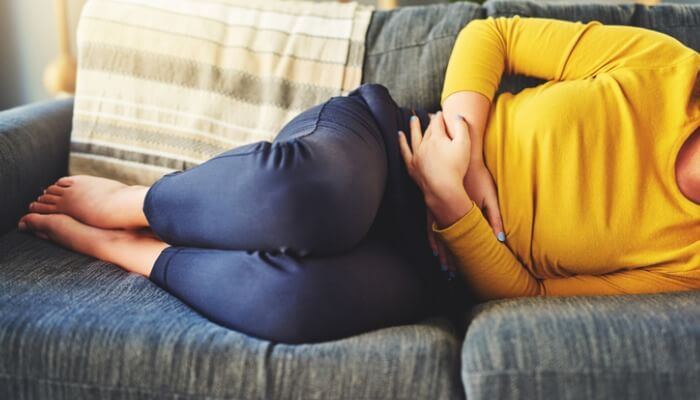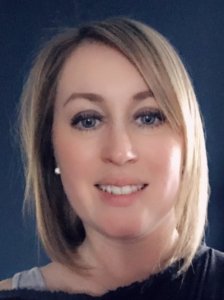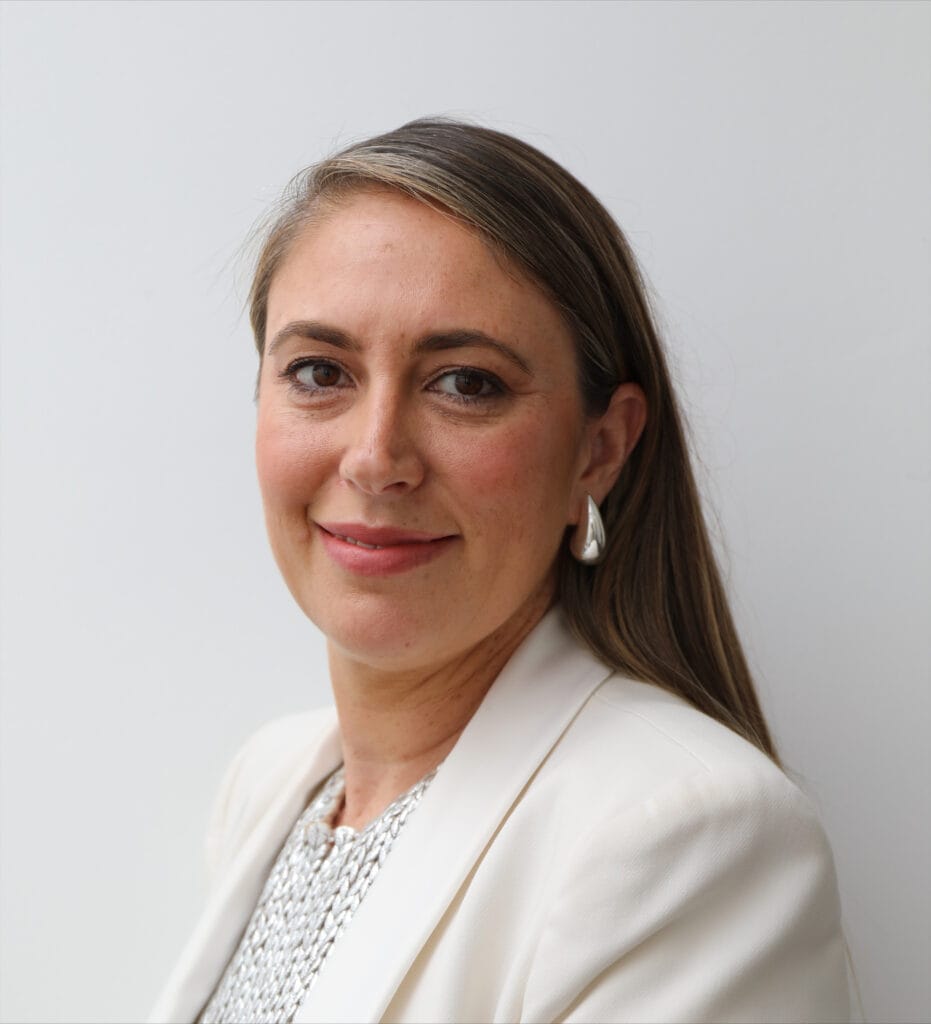Health Hub
Patient stories: living with endometriosis

Endometriosis is often described as a silent disease. But for the 10% of British women of reproductive age who suffer with it, this chronic condition is far from silent. We spoke to Holly Patel, a patient who underwent extensive surgery at King Edward VII’s Hospital to help combat her debilitating symptoms and get her life back.

My journey to endometriosis treatment at King Edward VII’s Hospital
It was in 2015 that I first started to think there was something wrong. After I had my daughter, my husband and I tried to conceive again for a couple of years with no results, so we wondered if there were any underlying problems. We decided to make use of the private medical insurance I have through work to see a specialist.
My periods had been getting heavier and after having a scan at the Lister Hospital in London in 2017, I was diagnosed with fibroids, which were then removed through surgery.
My medical team also mentioned that I had a “tiny bit of endometriosis”: but at the time, I didn’t know what that was.
After surgery, we carried on trying for a baby, but my symptoms soon came back and I had further surgery.
Each month, my pain was getting worse and worse. I was under the care of the Spire Wellesley in Essex where I live, but then I was referred to another specialist on Harley Street and from there, I was referred to Mr Cutner at King Edward VII’s.
At my first scan in 2017, my endometriosis was only minor. But in 2019, now under the care of Mr Cutner, it had developed into a severe case, and had penetrated 5cm into my bowel. I was shocked at how quickly it had progressed, but it explained why my pain had become so severe.
I now know that with endometriosis, every case is different. Some do experience rapid development, whilst others will always live with a mild case.
Is endometriosis hereditary?
My sister was diagnosed with endometriosis a few years ago, so it wasn’t a surprise that I had it too. Her endometriosis didn’t affect her bowel, however – so it’s very true that, even in families, cases can be very different.
I always knew that gynae problems were common in my family. My mum was diagnosed with fibroids when she was a younger woman, but back then, things like that weren’t really talked about. There certainly wasn’t as much knowledge around the symptoms of endometriosis.
But hearing my sister and I describe our symptoms, my mum thinks that she probably had endometriosis too – sadly not diagnosed. My maternal grandmother also had problems and a hysterectomy at a young age.
About a year ago, my sister had a hysterectomy to help her manage the symptoms of her severe endometriosis. She doesn’t have any children, but her pain was so severe that it was her only option.
Because my endometriosis was affecting my bowel, I was considered an urgent case, so I was quickly booked in for surgery after having my second scan in 2019. I suspected that I too would need a hysterectomy due to my family history, but I thought I’d have more time than I actually did.
A hysterectomy for endometriosis
I had a hysterectomy at King Edward VII’s Hospital in January this year. My surgical team were hoping a bowel resection wasn’t required. However, when they carried out surgery, they realised that my endometriosis was so bad, that they had to do a bowel resection. I also had to have stents put in place in my ureter.
When I first met Mr Cutner, he was so reassuring. He gave me lots of information and told me that that things would probably get worse before they then got better, in three to six months. He put me in touch with the bowel surgeon who was great, and all of the medical secretaries I spoke to were fantastic. I can’t fault any of the King Edward VII’s Hospital staff.
After surgery, there’s quite a lot to take in and I had lots of questions when I got home. I got in touch with the consultants’ secretaries and got replies straight away, either with advice from the consultant, or to tell me when I might receive advice. Mr Cutner even telephoned me at home to reassure me that what I was experiencing during my recovery was normal.
I had the stents removed in March and needed a scan on my kidneys, as my surgeon said there was a small issue with my left kidney. I’m also due to have surgery to have my bowel resection reversed, but due to the current COVID-19 pandemic, that surgery is on hold. So for me, it’s an ongoing situation that’s being monitored. Because I‘m still recovering, I’m not yet back at work, but I will be eventually.
Endometriosis pain: much more than bad periods
I consider myself to have a high pain threshold. When I first discovered I had fibroids, I just thought that I had painful periods and that was that.
I was still going to work throughout the pain, despite my mum telling me on numerous occasions that I looked exhausted and pale, and that I should stay at home. I was feeling really spaced out, but I was just trying to manage the pain. I really struggled with the simple things, like driving to work and maintaining a normal life.
Over the course of about a year, it got to the point where I was in so much pain, that I was being sick and almost fainting each month. Because it had begun to affect my bowel, it also became excruciating to go to the toilet.
The pain got so bad, and I couldn’t take it anymore. I was dreading my period each month, but each month I was wondering, am I pregnant? Then: no, and here we go again with this intense pain.
I was so ill with it, but I just felt silly complaining as I thought it’s just my monthly cycle. But after a few months where the pain was completely unbearable, I said to my husband that enough was enough and I needed further help.
The problem is, painful periods are too often just dismissed as “women’s problems”. There’s definitely a stigma attached to these kinds of medical complaints, just like there was when my grandmother and mother were young.
I was lucky, as I had private healthcare insurance, so I felt like I was taken seriously. I had to see my NHS GP to start with, but when I decided I wanted to choose privately-funded help, I could, straight away. My GP referred me once I said I had healthcare cover. Where I work, a few of the women have similar problems and recommended a consultant at the Wellesley. Once there, they had the knowledge to say that my case was beyond their speciality, and referred me to the consultant at the Lister Hospital. Then from there, I ended up under the care of Mr Cutner at King Edward VII’s Hospital. I was so fortunate to have had that journey to where I am now.
My sister had her diagnosis and surgery under the NHS, but for a long time, her problems were recorded as “just” painful periods. It seemed to me that her GP simply didn’t know enough about endometriosis. Because she was young and hadn’t had children (she was 35 at the time), she really had to push for her hysterectomy. Funnily enough though, she did see Mr Cutner and his team in his NHS role at UCLH. Once she finally got to see the right person, she received the help she needed.
Endometriosis affected every aspect of my life
Before surgery, I’d got to the point where my periods lasted around two weeks. The fibroids made me bleed heavily too, and because of this, I was really worried about leaking when I was out of the house.
My social life really suffered, and when I did leave the house, I was always dressed in black as I was so conscious of leaking. I barely had any energy for two weeks out of four and was so tired from the pain. Then I knew I only had two weeks before it would all start up again. Living in this cycle was exhausting.
Work-wise I was worried too. We have a system called the Bradford Factor at work, which monitors and records short-term sickness episodes. The more sick days you take, the more points you get. As your points go up, you get warnings.
I was very conscious about elevating my Bradford Factor, so I struggled in. When I wasn’t having my period, I looked well and healthy – which made it harder to tell people about my long-term condition.
But my reality was intense and regular pain. What does endometriosis pain feel like? If I were to describe it to a person who didn’t know, I’d say it was like a ripping pain on my insides.
Life after endometriosis surgery
Before I had surgery, I was having regular injections to bring me into a pseudo-menopause. I was experiencing menopausal symptoms such as hot flushes, but at least I wasn’t having periods. At the time, I thought: wow, I actually feel well. Then I thought that maybe I didn’t need a hysterectomy, almost like I’d imagined the whole experience.
My sister had similar injections and had said the same thing. But when the effects of these hormonal injections wore off, she started to feel the pain again. I knew I had to go the same way and have surgery.
Now it’s been a few months since my endometriosis surgery. Although I’m still healing, I’ve got so much more energy and I don’t feel exhausted anymore. I don’t have to live in the fear and dread of my period that I had for so long.
I’m due to start on hormone replacement therapy, but my medical team want to make sure that any endometriosis cells left behind are under control first. At the moment, I’m suffering the effects of the menopause, but I’d rather that than the pain I used to be in.
I sometimes wonder if things could’ve been different – if I might not have needed such drastic surgery. But by the time I saw Mr Cutner, my endometriosis was so severe that there wasn’t much else he could suggest. The risk of permanent damage to my bowel was so great that I had to have surgery.
Some people suggest controlling endometriosis with diet, exercise and supplements. But for me, it was so aggressive that it spread too quickly.
My surgical team said I would need three to six months to recover, but with my bowel resection reversal being postponed, it will take longer than that. Life is gradually returning to normal though, although I have to be careful with lifting things. I still have a way to go, but compared to how I felt after surgery in January, I see an improvement each week and I’m able to do much more around the house now.
The future for endometriosis patients
Since meeting Mr Cutner, I know that there’s been a lot more research into endometriosis. I’m hopeful that in the future, it will be better recognised and understood. I hope that GPs will have a better knowledge of it and that when women complain of painful periods, it’s not just brushed under the carpet.
From my own experience, finding a sympathetic doctor was difficult initially. I find it shocking that there’s not enough training on these issues to understand them more. So much more could be done to raise awareness.
I follow celebrities on Instagram who are raising awareness, which is great. But I think it needs to be on television more, particularly in the daytime, as I think that could help. When endometriosis was first mentioned to me at my scan in 2015, I had to ask what it was. The sonographer asked if I’d ever bled out of my belly button, as I had endometriosis and that can happen. I hadn’t experienced that, but how scary if I had done and didn’t know why!
I was almost 39 years old when I was diagnosed with endometriosis, but I was living with it for a little while before my first scan. It’s frustrating to think that if that knowledge had been there when my mum was younger, my sister and I could’ve looked out for signs earlier.
But it’s good to know that my daughter will have that knowledge. She’s now 12 years old, and started her periods two years ago. My consultant has told me that she will likely also develop endometriosis, so we’ve taken her to a doctor who has put her on the contraceptive pill.
I feel cheated that we couldn’t expand our family because of endometriosis. Had I received an earlier diagnosis, we could’ve made different decisions – likewise with my sister, who hasn’t had children. Endometriosis isn’t life threatening, but it can have a huge impact on your life.
Sharing my story
Now that I know so much more about endometriosis, it feels good that I can make choices that will help my daughter in later life. I hope that other people can get access to this knowledge too, but without going through the journey I have or it being too late.
Sometimes, laser surgery to burn away endometriosis is effective, for example, so women need to know there are choices like this available.
By sharing my story, I hope to empower other women to get checked as soon as they can, if they think they have symptoms. I urge women to not give up: ask for a second opinion if you don’t get the response you want.
Women tend to be more open than men, and we talk about our health struggles more honestly. The more people that talk about endometriosis, including celebrities, the better. It needs to be talked about in schools too, so that any young girl experiencing pain and heavy bleeding each month knows she can seek help – and not be embarrassed like my daughter was.
Young people are taught how to look after their physical and mental health, so I think their reproductive health should be talked about too. In fact, I think periods and pelvic pain should be spoken about more in general. I hope that – in time – they are.
More information
- If you think you may have endometriosis, the first step in getting a diagnosis is making an appointment with your GP. (Don’t have a GP?)
- The King Edward VII’s Hospital Endometriosis Centre is led by Mr Alfred Cutner and is one of only a few private medical centres to achieve accreditation by the British Society for Gynaecological Endoscopy (BSGE). We specialise in diagnosis and treatment and offer one-to-one support from our Clinical Nurse Specialist.
Article Sections
Latest Hospital News
Should you wish to speak to our press team, please visit Press Enquiries




